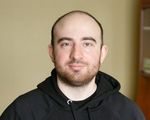About Success Builder
How do you find your place in life? How do you find something to do that both comes naturally to you and makes you happy? The answer is that you have to apply the knowledge you’ve gained from university and from life itself correctly. The Success Builder Project features HSE University graduates who have discovered themselves through an interesting business or an unexpected profession. The protagonists share their experiences and lessons learnt and talk about how they’ve made the most of the opportunities they were given.
Ekaterina Kolchina, a graduate of ICEF and London Business School, is currently the deputy CEO of Papa John’s Russia. An education in economics certainly came in handy for this. In the latest edition of Success Builder, Ekaterina talks about the human side of consulting, stereotypes about the restaurant business, and taste-related aspects of working at a pizzeria.
What sort of professional trajectory did your education give you?
After getting my bachelor’s in economics and finance from HSE, I reached the conclusion that banks and finance weren’t really for me, even though I got good grades here. Thanks to my undergraduate internships, extracurricular activities, and case competitions, I realized I was better suited for consulting and project management. I also saw I had the necessary skills for this and just needed to get a feel for how to apply them more skillfully.
My internship at KPMG helped a lot at the beginning, and it’s thanks to the HSE Case Club that I learned about KPMG’s strategy department. After HSE, I took my experience and enrolled in the Master’s in Management programme at London Business School, where I was able to assess the weight my degree, and most importantly knowledge, held.
In this sense, HSE and ICEF are at the forefront. By studying in London, I knew two-thirds of the master’s curriculum, and it’s thanks to this that I was able to concentrate on the practical aspects of applying my knowledge. This was really aided by what I learned from cases as well. For me this was the final step in transforming my thinking into something more applied and real.
Why is it common for ICEF graduates to continue their education in the West?
Everything depends on a person’s personal goals. If you need fundamental academic knowledge, then you can study in Russia as well. But if you need to immerse yourself in the details of new, understudied fields of science, or if you want to gain applied knowledge or learn about western corporate culture, then it’s worth going to an international university and trying to find work abroad. One shouldn’t do this just to check a box, though. The world is changing, and no matter where you gain your knowledge, in 10 years it might all be completely irrelevant. It’s worth focusing on skills and tools.
What skills did you enter the professional world with after your master’s?
The first skill is ambitiousness. The people who come to HSE have ambition, and internally they learn how to keep this ambition and set even higher goals. During your time at the university, the bar is raised thanks to a rating system and the people around you. People play sports, grow, take an interest in the world, and manage to do all three. You grow a lot right alongside them.
The second most important skill is the ability to study all the time, solve multiple tasks simultaneously, get outside your comfort zone, and truly enjoy constant challenges. Being able to study constantly helped me work within different industries – consulting, marketing at a magazine, the finance department at a bank… Now I’ve randomly ended up in the restaurant business, though the field is mostly eCommerce.
What impact did your first work experience have on you?
Alongside what I knew and was able to do, I learned to negotiate with people, which turned out to be a very important skill. My job has always involved communicating with a large number of very different partners and stakeholders.
I have always been a communicative person, but on the first day of my first job when I was 18, I got confused and made a mistake in a piece of correspondence. I got quite the earful for this
But thanks to this mistake I learned about the intricacies of corporate relations and now know how important it is to prepare for any sort of talks and to listen to everyone’s opinion.
This is an extremely useful skill in consulting as well, where you can have very different kinds of relations with clients. It’s important to have your own opinion, but on the other hand it’s crucial to negotiate with other parties in a positive manner so that you’re seen as a mediator and moderator, and not as a prosecutor. I became so skilled at this that my managers at different jobs admitted to me that they called me in for some projects specifically so I could handle our more difficult partners.
And you decided to continue working in consulting?
After KPMG, where I truly enjoyed my work, I realised that I wanted to fly even higher, so during my master’s programme in London I started looking for full-time work at the Big Three consulting firms. I got a call from McKinsey, which really changed my fate. They did the first round of interviews in London, and then invited me to interview in Moscow and paid for my flights. It was the holidays, so thanks to McKinsey I got to see my parents. It’s great that the company met me halfway because our family couldn’t afford to see each other regularly. My parents sold their car to pay for my studies in London.
I got the job at McKinsey and entered my fourth semester completely elated. I spent a little over four great years at the company, focusing on projects in Russia, the CIS, Spain, and Great Britain. This is more time than the majority of people spend in consulting on average. Larger consulting firms are a platform that gives people looking for cool jobs a broad overview of the market. And once you have experience at a great company, a world of opportunity opens up for you to grow – everyone jumps at you.
Why did you leave?
Honestly, I was asked to work on a different project I’d always dreamt about. For me the ideal field to work in is education because it’s thanks to the fact that my parents focused on education so much that the very best ended up happening in my life. I lived outside of Moscow when I was a child, and my parents took me to a school focused on physics and mathematics. Twice a week they’d take me to Moscow for English lessons (there weren’t any classes in our town) because even back then they already understood how important this was for a good profession.
But mathematics and languages are not really a profession, but just tools, and at the time ICEF was the only school on the market combining these two tools. My parents also helped me decide on ICEF. Because of that, when I was asked to head the project office of an educational startup called Letovo, I said yes on the spot. This was essentially a consulting project, and I helped the director of the school solve business problems. That’s how I left consulting, but I’ve kept in contact with my colleagues. I definitely thought I’d be returning.
But you ended up at Papa John’s. What are you doing now?
[Laughs] It’s easier to tell you what I don’t do, even though I only joined the company recently. My main job is providing operational support to the CEO when it comes to decision-making. In 10 years, the company grew from four restaurants to 150, and now we’ve set the goal of growing from 150 to 450 restaurants over the next 3-5 years. Because of this, a lot of additional areas of responsibility spring up such as investor relations, team expansion, PR, etc., and the quality of our decision-making process has to improve on all fronts. The second area is project work. The business operates well, but in order to be successful on a new scale and under current conditions, it’s critical that processes be transformed slightly. My consulting experience helps here because each part of the job is similar to the projects I encountered in my ‘past life.’ For example, we introduced a process for setting goals and are also working to develop a new organisational structure, transform the director and line personnel motivation system, optimise our work with franchises, automate document flow, and more.
By the way, Papa John’s is currently hiring a fantastic group of business analysis interns from HSE, without whom our project work wouldn’t be as successful
What I like about the restaurant business is you get the opportunity to visualise the client and understand for whom you’re doing everything. The restaurant business is of course difficult, but gratifying. I find motivation in the fact that you quickly see the payoff in this business. That moment cancels out any apparent lack of ‘prestige’ there might be.
The restaurant and food industry really has ‘incompetent business karma.’ How do you handle the stereotype?
When I agreed to interview, I was thinking the whole time, ‘OMG this is the restaurant business!’ And now I sometimes see that it’s necessary to convince good people to come work here and tell them a lot about the inside kitchen in order to convince them that their preconception is wrong. I think this is because for a long time the restaurant business was sort of in last place as far as applying new technologies and management practices go, but now the situation is changing rapidly. My CEO says he still can’t believe he works at a pizzeria. He’s a foreigner with a prestigious education. He worked for many years in the finance industry, and he made the right decision when he bought a Papa John’s franchise in 2008 on the advice of his father. I’ve concluded that it’s not so important what sphere you work in; the main thing is the team and the results of your work.
What is difficult about the restaurant business?
Like in any distributed business, managing a chain is hard. The human factor plays a role, though – you can spend a long time creating the highest quality product on the market, but the waiter who’s rude to a client will ruin all your efforts. That’s why it’s important to remember about the thousand staff members there and to build a unified management system.
Another difficulty is having to shorten lead times in each of our 150 restaurants, all while maintaining quality. We are a digital business. The client expects delivery 30-40 minutes after placing an order, and this wait time is shortening each day. If we are slow, we’ll be off the market.
How does technology and eCommerce affect the evolution of the restaurant business, which is quite archaic really?
Technology allows us to increase speed and free up time. If you have an electronic document flow system, you free up people’s time for classes, which is very valuable for business. If a client uses the mobile app to order pizza, they save time. It’s the same on the website, where customers can see their favorite items at the top. Technology also has cost-saving benefits; we aren’t the ‘richest’ of businesses and have to constantly monitor P&L.
So technology is important, especially for businesses that require speed and don’t have a ton of money – the restaurant business, for example. But whereas drones are not ready for everyday use, AI is something we use in our quality assessment system for pizza. A camera near the end of the oven allows the system to monitor the quality of the pizza being made. This is rather time-consuming – we have dozens of different types of pizzas, and its not easy training the AI to rate each of them using the huge number of parameters we give it.
What else is changing at the company?
We are also the first in the food delivery business to work with the project Yandex.Station, which uses AI named Alice to order pizza through a voice assistant.
Additionally, we are developing a business intelligence system to look at different data and extract what’s important for business. This will help us better manage and analyse – in real time – what is happening at our restaurants, at the factory, and in the office. Lastly, we are of course always in the process of improving our website to be as convenient as possible for users.
Where do you see your career going in the future?
My current setup is still ideal for me, but on the other hand it’s a big challenge. This is the first time I’ve had to impact all aspects of the company’s operations at the same time during rapid growth. These kinds of responsibilities are what drive me. Also, Papa John’s has a great team of people with whom I want to grow.
Work is also a form of education to a large extent. Even if you have a cool MBA, you’ll still have to continue learning because in our new reality, business will be completely different in five years.
How many times a day do you eat pizza?
Not as often as you’d think. Our office is near a pizzeria, so we always get the wonderful smell of hot crust. At first it’s a big test, but you get used to it and don’t succumb to the temptation that easily anymore. Still, you have to try it because you have to know the product you’re working with. I do this regularly at different pizzerias – when I’m hungry of course.













































































































































